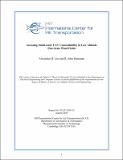Assessing Multi-rotor UAV Controllability in Low Altitude Fine-Scale Wind Fields
Author(s)
List, Alexander H.; Hansman, R. John
DownloadICAT-2019-12_List, Alex.pdf (7.070Mb)
Metadata
Show full item recordAbstract
This study presents a means of assessing unmanned aerial vehicle (UAV) control in
various environments using control margin. The metric gives an instantaneous
measure of control authority and is defined by dividing required torque by maximum
available torque. Required torque is the sum total of torque developed by a vehicle's
rotors and residual terms representing the torque required to compensate for any
remaining disturbances. The metric was demonstrated on a representative small quad-rotor
UAV in real world and laboratory environments. Utilizing only rotor revolutions per
second and inertial measurement unit information, the metric indicates degraded control
in conditions consistent with loss of control. This metric may ultimately be useful in
understanding the low level wind environment, for certification of vehicles, or for real-time
monitoring of control authority.
Date issued
2019-09-03Series/Report no.
;ICAT-2019-12